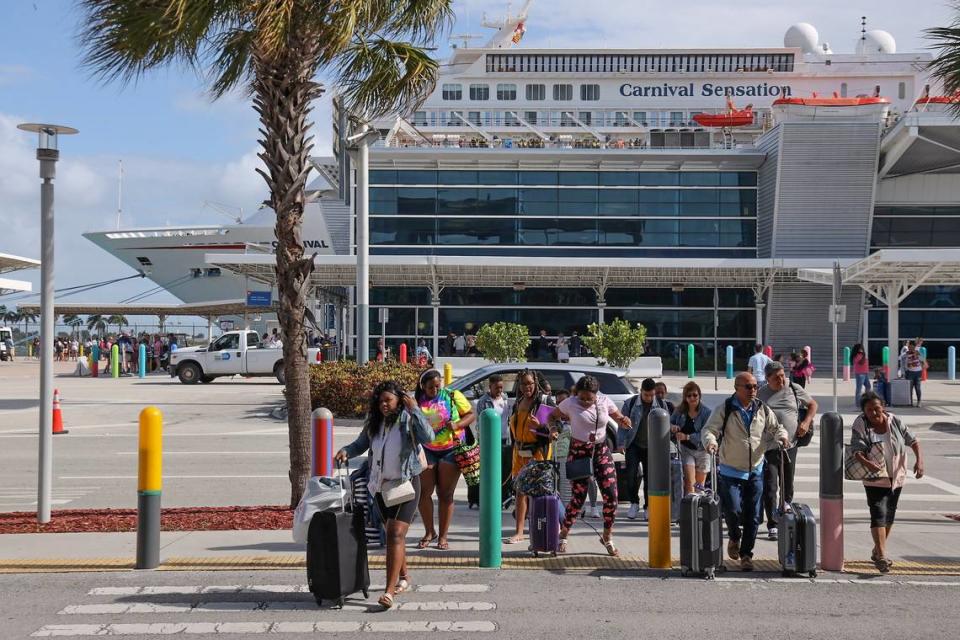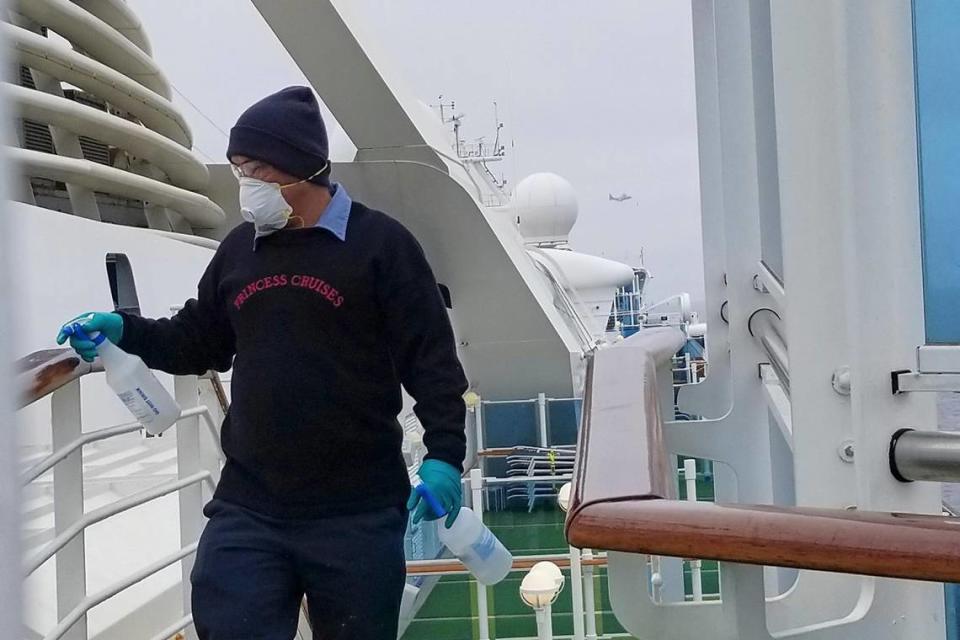Cruise safety over bailout is White House focus for industry amid coronavirus
The Trump administration will review a plan to improve health and safety procedures on cruise ships amid an outbreak of the coronavirus, Vice President Mike Pence said on Tuesday, as senior White House officials distanced themselves from the prospect of a bailout for the industry.
The White House has been in talks with the executives of cruise lines crippled in recent weeks by the rapid spread of the novel coronavirus, which has depleted new reservations entering their high season and quarantined ships off the coasts of Florida and California carrying dozens of passengers reporting symptoms.
The administration will now review a proposal for “advanced screening, improving medical services on ships, providing for airlift evacuation and land-based care,” Pence said at a briefing with reporters. “We will be reviewing that over the next 24 hours. The president’s objective is for us to make the cruise lines safer, even as we work with the cruise lines to ensure that no one in our particularly vulnerable population is going out on a cruise in the near future.”
But asked whether the president would propose a bailout for the cruise lines — which are registered overseas and exempt from federal income taxes — Pence declined to respond, while Larry Kudlow, director of the National Economic Council, shook his head.

A White House official told McClatchy that the president intends to release a comprehensive economic stimulus package in response to the outbreak all at once, in an effort to send a message to financial markets as well as individual industries, including travel sectors, that the federal government is prepared to help.
Any provisions of that package that might be perceived as a bailout to the cruise industry would be controversial for Republicans and Democrats on Capitol Hill.
While pitching Senate Republicans on a temporary payroll tax cut to ease the economic strain caused by the coronavirus outbreak, President Donald Trump also told lawmakers he supported economic relief for the cruise line industry.
“We want to protect our shipping industry, our cruise industry, cruise ships. We want to protect our airline industry,” Trump told reporters in brief remarks following his closed-door lunch meeting with lawmakers on Capitol Hill.
But Trump did not go into details in public — and in private, he similarly offered few specifics on what kind of relief he had in mind, Republican senators said.
From the coronavirus outbreak on the Grand Princess cruise ship that was stranded off the coast of California for days, to the general fear of being trapped in confined spaces with people of unknown health histories, the cruise industry is already staring down a financial crisis.
“They were just talking about, in general, that the airlines and the cruise industry and everything are gonna get hit hard,” Sen. Richard Shelby, R-Ala., chairman of the Senate Appropriations Committee, said of the message from Trump and his Cabinet members.
“It’s reasonable to think that if you’re going to have some sort of adjustment for people who are losing hours in terms of working, that would apply to certain industries who are impacted more dramatically than others,” said Sen. David Perdue, R-Georgia. “Look at travel right now, the cruise business, things like that.”
Taxpayer relief is not top of mind for the chairman of the industry’s lobbying group Cruise Lines International Association, Adam Goldstein. He said cruise companies have been focused on how to up their protocols meant to keep crew and passengers COVID-19-free since meeting with Pence in Fort Lauderdale on Saturday.
“We haven’t been thinking about that,” he said about the prospect of a government bailout. “We haven’t thought about anything but this plan.”
Goldstein declined to share specifics of the plan, but said the most important element is the ability to test people for COVID-19 at sea. He is not aware of any cruise ships that have the testing kits on board yet, though he said orders have been placed.
Still, the White House is expected to push for assistance to affected industries to be part of an economic stimulus package now being negotiated between Treasury Secretary Steve Mnuchin and House Speaker Nancy Pelosi, D-Calif.
That would be a welcome development for elected officials from Florida, a state where the cruise line industry is a significant economic driver.
“Thousands of jobs are at stake,” said Rep. Donna Shalala, D-Fla., whose district includes PortMiami, the world’s largest passenger cruise port.
A former U.S. Secretary of Health and Human Services, Shalala said she would be meeting with industry executives in Washington on Wednesday but that, at this time, the cruise industry was not asking for a bailout or stimulus. Miami-Dade Mayor Carlos Gimenez, a Republican running for Congress in 2020, will fly to Washington on Wednesday to also meet with cruise executives.
Democrats, however, described the administration’s plans to help the cruise line industry as a “bailout” — a response they derided as insufficient when the federal government should be focusing its efforts on targeted assistance for workers who lack paid sick leave.
“I think it’s predictable that the administration is likely focused on industries. Our focus, in our caucus, is on individuals,” said Sen. Chris Murphy, D-Conn. “I have seen plenty of industry bailouts where the money never, ever got to workers. So my focus is on the people that are having to stay home with sick kids, the people who are being laid off.”
Rep. Peter DeFazio, D-Ore., the chairman of the House Transportation and Infrastructure Committee, agreed it would be “premature” to discuss a bailout of the cruise line industry, particularly an industry that is tax-exempt.
“They don’t pay taxes in the United States of America. If they want to reflag their ships … and they want to hire U.S. crews and pay U.S. wages and pay U.S. taxes, then maybe,” he said.
The administration has sent mixed messages to Americans on whether they should keep their plans to go on cruises as the warm seasons approach. While members of the White House task force said that “healthy” Americans could continue with their cruising plans, the State Department issued an alert this week warning all U.S. citizens against cruise travel.

Sen. Marco Rubio, R-Fla., who has been in close touch with the cruise industry, said he has “heard no discussion of bailouts for anyone at this point.”
“I haven’t even begun to think about what relief we could possibly offer for the cruise industry,” Rubio added. “I think just keeping the White House from prohibiting cruise ships has been helpful.”
Senators were also unclear on whether the White House wanted new health standards for cruise lines to be codified in legislation.
Rubio said earlier Tuesday that he wanted the industry to “be following the highest level protocols and they should have in place pre-existing arrangements so that if a cruise gets into trouble we don’t have to scramble and find where to quarantine 4,000 people, which is what has happened a couple times.”
Rubio didn’t, however, say he wanted new protocols to be codified in legislation, saying it “needs to be a public-private collaboration.”
Sen. Richard Blumenthal, D-Conn., who has been pushing legislation for years that would mandate all cruise ships to have trained medical professionals and set standards for how medical situations are handled, said anything short of a federal response would be insufficient.
“It has to be binding,” Blumenthal said. “There has to be mechanisms for enforcement.”
Alex Daughtery contributed to this report. This story has been updated with comments from the Cruise Lines International Association.

